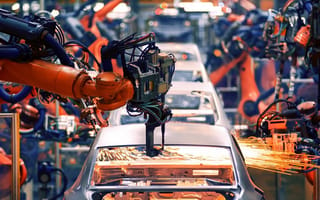Inefficiencies. Faulty products. Costly machine maintenance. Those are just a few of the many issues plaguing the manufacturing industry. But thanks to a combination of human know-how and artificial intelligence, data-driven technology — better known as Industry 4.0 — is transforming the entire sector.
“What if existing manufacturing and large technological innovations came together to create the next big manufacturing reinvention?” Boston Consulting Group senior partner Olivier Scalabre mused. “This is the fourth manufacturing revolution, and it’s happening right now.”
AI in Manufacturing
Current evidence: autonomous robots interact with one another and learn from their human counterparts; computers are trained to spot even the most minuscule flaws in machines and products, such as wavering pressure conditions in oil wells; and the marriage of AI and IoT devices makes possible predictive maintenance that proactively assesses equipment performance in everything from diamond-tipped titanium cutters to connected meters that monitor safety levels in a smart factory.
Here are some innovative companies using AI to improve manufacturing in the era of Industry 4.0.
AI in Manufacturing Examples
Top Companies Using AI in Manufacturing
- Siemens
- IBM
- Amazon
- Intel
- Gray Matter
- GE
- NVIDIA
- Veo Robotics
Location: Carson, California
How it’s using AI in manufacturing: GrayMatter Robotics develops AI-powered robotic systems with a focus on automating manufacturing and industrial operations. The company’s solutions work to enhance operational efficiency and quality by integrating robotics and artificial intelligence into manufacturing processes.
Location: New York, New York
How it’s using AI in manufacturing: Augury provides manufacturing companies with insights into machine health, processes and operations. Its solutions work to help customers reduce maintenance costs and downtime while increasing productivity and output and achieving sustainability goals.
Location: Washington, D.C.
How it’s using AI in manufacturing: Siemens maximizes productivity in the industrial and manufacturing sectors by exploring the capabilities of AI and machine learning. The company has homed in on industrial automation and data analytics as two areas where AI has the ability to thrive. As a result, businesses have come to rely on Siemens’ technologies to reduce machinery costs, improve consistency with automation and deliver instant data for quickly adjusting workflows.
Location: New York, New York
How it’s using AI in manufacturing: IBM offers cloud, AI and machine learning tools with the goal of cutting down production times and costs for businesses. While IBM Watson provides a suite of AI solutions, manufacturers have especially enjoyed its predictive intelligence and automation features. Companies are now able to compile rich data insights that track business trends, anticipate potential risks and determine how to best incorporate automation technology.
Location: Seattle, Washington
How it’s using AI in manufacturing: Combining force feedback sensors and computer vision, Vulcan is Amazon’s first robot to have a “sense of touch”, allowing it to pick up and stow tightly packed inventory with human-like dexterity — thus reducing the need for employees to use ladders or work in awkward positions. Vulcan was first announced in May 2025, and is now being rolled out across its fulfillment centers in the United States and Europe.
Location: Santa Clara, California
How it’s using AI in manufacturing: Intel gives businesses an intelligent edge by tying together information, operation and AI technologies. Within the manufacturing industry, the company has leveraged AI to generate real-time data that enables teams to quickly fine-tune workflows. Simulation, machine vision and predictive maintenance have also become areas of interest for Intel’s AI tools as the organization pushes for Industry 4.0 innovations in manufacturing.
Location: Milwaukee, Wisconsin
How it’s using AI in manufacturing: Rockwell Automation promotes what it calls “Smart Manufacturing” by wielding AI to reinforce systems, cybersecurity measures and other aspects of the manufacturing process. The company’s FactoryTalk Analytics LogixAI product uses predictive capabilities to foresee potential setbacks, encourage proactive measures and preserve product quality. The module blends machine learning with a powerful modeling engine to anticipate issues, predict outputs and streamline overall operations.
Location: Boston, Massachusetts
How it’s using AI in manufacturing: GE’s artificial intelligence team helps manufacturers prioritize efficiency and safety, and it’s branched out to cover various verticals, including automation, computer vision and robotics. One result of these efforts has been GE’s autonomous robotics systems, which make workplaces more productive with automation and AI technologies.
Location: Los Angeles, California
How it’s using AI in manufacturing: Machina Labs’s manufacturing platform aims to bring about new levels of innovation for the industry. It uses robotic sheet processing as the first element to create parts faster, and with the help of AI-driven sensors, the company’s robots use data to manipulate metal sheets to fit a part design. The data is also stored digitally to provide future process characterization and part qualification information.
Location: Austin, Texas
How it’s using AI in manufacturing: Mythic creates intelligent processing units for a slew of devices, including some in the manufacturing industry. The company wants its IPUs powerful enough to let robots and drones communicate conversationally so they can respond and react to situations in real-time. Mythic says its IPUs support all popular styles of deep neural networks, have virtually unlimited processing capabilities and require less energy to operate while providing more power than similar products.
Location: Santa Clara, California
How it’s using AI in manufacturing: To make it easier for manufacturers to develop complex products, NVIDIA is equipping teams with its AI-based products NVIDIA RTX and NVIDIA Omniverse. NVIDIA RTX allows engineers and designers to envision product concepts with visualization technology. Then NVIDIA Omniverse facilitates collaboration between team members within a single virtual platform, bringing to life NVIDIA’s goal of an AI-focused factory.
Location: Chicago, Illinois
How it’s using AI in manufacturing: Uptake designs and develops enterprise AI software for many industries, including manufacturing. The company’s artificial intelligence combines material, process and equipment data to offer suggestions on how to reduce energy costs, optimize labor and product reliability and improve the operations process as a whole. Because of its partnership with Element, Uptake continues to help industrial companies find new ways to turn raw data into actionable insights geared toward efficiency.
Location: Waltham, Massachusetts
How it’s using AI in manufacturing: Veo Robotics combines 3D sensing, computer vision and AI to make robots safer to work within a manufacturing setting without the need for cages or operations shut-downs to perform inspections. The company’s AI constantly monitors a robot’s surroundings and temporarily shuts down a bot if a nearby human or a malfunction is sensed. Because of its impact on the manufacturing industry, Veo Robotics was named to the World Economic Forum’s Technology Pioneers of 2020 list.
Location: San Jose, California
How it’s using AI in manufacturing: Automation Anywhere creates enterprise-grade Robotic Process Automation (RPA) platforms for a group of industries, including manufacturing. Large companies have used Automation Anywhere’s AI-based platform to automate procurement, manage regulatory requirements and collect actionable insights about manufacturing processes. The Channel Company, which focuses on IT news and events, awarded Automation Anywhere a five-star rating in 2022 for its impactful initiatives and commitment to collaboration.
Location: Fully Remote
How it’s using AI in manufacturing: Arch Systems provides a factory-focused AI Copilot that turns complex manufacturing data into actionable real-time insights. Its platform can build a unified digital twin of factory operations by connecting to machines as well as cloud, MES and OT systems. This helps it label downtime events, deliver automated alerts and provide tailored recommendations.
Location: San Francisco, California
How it’s using AI in manufacturing: Samsara’s portfolio features AI-powered software and hardware solutions that businesses rely on to enhance safety, productivity and sustainability. Samsara Intelligence is the company’s expanded suite of AI offerings, which launched in 2024 to help businesses in industries like manufacturing automate tasks and access insights that can inform the way they optimize their operations.
Location: New York, New York
How it’s using AI in manufacturing: Dandy produces custom dental restorations using artificial intelligence and 3D imaging technology. It creates patient-specific designs and machine learning models to guide automated production and power diagnostics. The company says that its combination of robotics and AI increase precision across workflows and deliver restorations more efficiently.



















